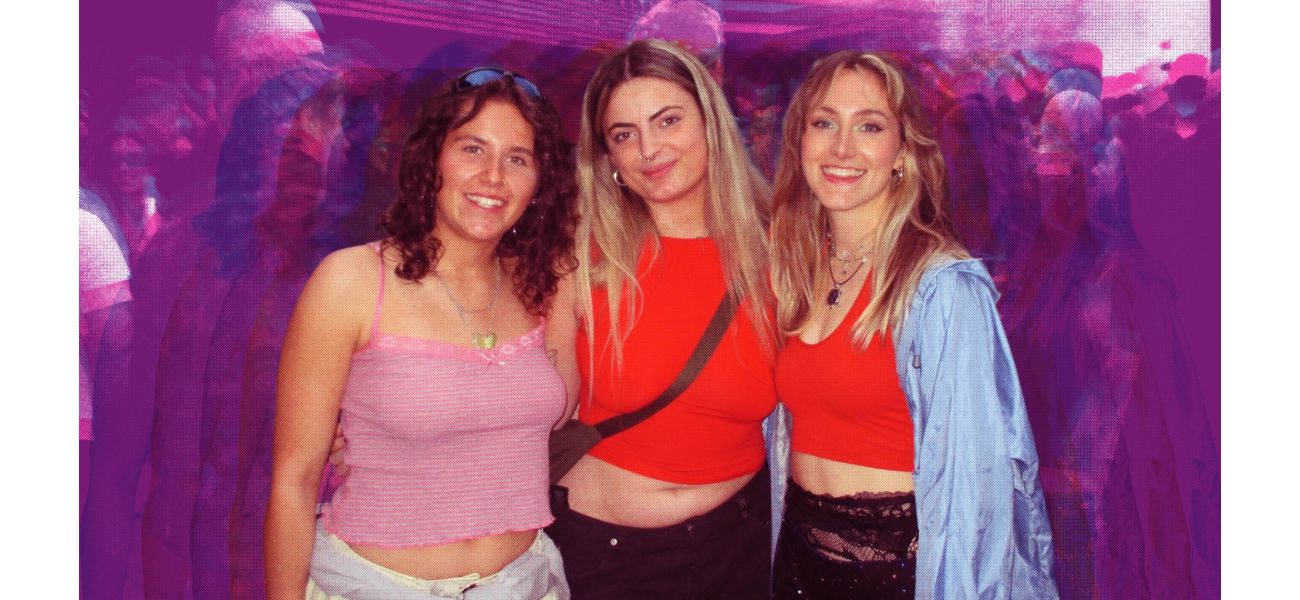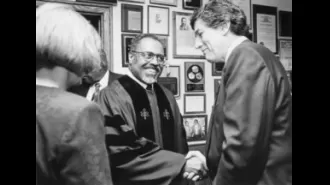The trend of daytime raves has grown, possibly due to the popular saying "Nothing good happens after 2am."
UK nightclubs closing at alarming rate, prompting change in clubbing culture.
September 27th 2024.

The clubbing scene in the UK is going through a major transformation. With a nightclub shutting down every two days, there is a growing concern that by 2030, there will be nowhere left to dance until dawn. The economic challenges faced by the industry, the rise of the sober curious movement, and the rising cost of living are just some of the reasons leading to the decline of clubs. However, amidst all this, there is still hope.
According to a report by the Night Time Industries Association, clubs and clubbers are evolving. People like 29-year-old Clarissa Bloom are finding new ways, times, and places to party. She tells us that she no longer goes out at night, opting instead for the safer and more relaxed atmosphere of a day rave. This trend has become increasingly popular, with daytime now being the new nighttime for thousands of people.
This shift has been attractive to not only parents and sober ravers, but also to the younger generation who are eager to reimagine what clubbing should look like. Clarissa, who works with the events business The Stag Company, shares her experience of her first day rave in Brighton, saying it was "amazing fun." She also mentions the unique feeling of leaving a rave in broad daylight while still feeling the buzz of the event.
"I stopped enjoying evening drinking a long time ago," Clarissa says, "Nothing good ever happens after 2am." She goes on to explain that the day rave scene is different, attracting a different group of people and fewer "creeps." She also points out that people are not as drunk during daytime events, making them nicer and more in control of themselves.
Clarissa's sentiments are shared by many others who have embraced this new trend. With night clubbing often leading to a write-off the next day, people are drawn to the idea of being able to dance, listen to great music, and have a good time without the consequences of staying out until the early hours of the morning.
But which clubs are having success with this new approach? Superclub DRUMSHEDS, one of the world's largest nightclubs, has capitalized on this "sensible" trend by setting up a 15,000-capacity venue inside an old Ikea warehouse in Tottenham, north London. The temporary venue, now in its third season, hosts popular acts such as Defected, Rinse, The Hydra, Fatboy Slim, and the Chemical Brothers.
Simeon Aldred, director of strategy at Broadwick Live, the company that runs DRUMSHEDS, explains that while the "nights" run from noon until 11pm, there is still a big market for the "immersive, dark, atmospheric" experience that was once synonymous with clubbing. He adds that the appeal of this new trend is the ability for people to come early, enjoy the full club experience, and still have the rest of their night free.
Broadwick Live's success lies in their use of non-traditional locations to provide a unique clubbing experience. They look for spaces with a story or a unique character, like old factories, warehouses, or places with an industrial edge. This approach has been a win for them, with millions of guests since they opened in 2017. Other venues, such as Brooklyn Storehouse, The Beams and Drumsheds, and Depot Mayfield in Manchester, have followed suit.
"People keep coming back and talking about it as one of their must-visit venues, which means we're doing something right," says Simeon. He believes that the reason for this success is the craving for something new and different. By transforming spaces not designed for clubbing into immersive experiences, they have created a unique connection between the venue and the guests. It's not just about the music, but also about the space and the atmosphere it creates.
As we look to the future, it's clear that the clubbing scene is evolving, and with it, new possibilities and experiences are emerging. So, while it may seem like the end of clubbing as we know it, it's also the beginning of a new era, with endless potential for growth and innovation.
As the nightclub scene continues to face challenges, with a nightclub shutting down every two days, there are concerns that the UK may become a cultural desert after midnight in just six years. Economic problems within the industry, the rise of the sober curious movement, and the high cost of living have all contributed to the decline of clubs. According to a troubling report by the Night Time Industries Association, if this trend continues, by 2030 there may be nowhere left to dance until dawn.
But all hope is not lost. Clubs and clubbers are evolving, and people like 29-year-old Clarissa Bloom are finding new ways, times, and places to party. The Londoner tells Metro that she has stopped going out at night and instead opts for the safer and more relaxed atmosphere of a day rave. For her and many others, daytime has become the new nighttime.
This trend has been attractive to parents and sober ravers for some time, as well as to older revellers who can no longer afford to lose sleep. But now, it is being embraced by a younger generation eager to reimagine what clubbing should look like. Clarissa, a relationship expert who works with The Stag Company, shares that she stopped enjoying evening drinking a long time ago, stating that "nothing good ever happens after 2am." Her first day rave experience in Brighton was "amazing fun," and she recalls feeling a bit disoriented leaving in the daylight while still buzzing from the experience.
"I love the idea of being able to dance with my friends, listen to great music, and not have to leave at 5am, which ruins the next day," says Clarissa. She also notes that the atmosphere at day raves is different, attracting a different group of people and fewer "creeps." Furthermore, she points out that people are generally nicer and more in control of themselves because they aren't as drunk as they would be at a traditional nightclub. "With night clubbing, the next day is always a write-off. I can handle some prosecco, but I can't handle a lack of sleep," she adds.
Despite the challenges facing the nightclub industry, there are still some success stories. One of them is superclub DRUMSHEDS, one of the world's largest nightclubs, which has capitalized on this more "sensible" approach by setting up a 15,000-capacity venue inside an old Ikea warehouse in Tottenham, north London. Since opening its doors last year, DRUMSHEDS has hosted popular acts such as Defected, Rinse, The Hydra, Fatboy Slim, and the Chemical Brothers, among others.
Simeon Aldred, director of strategy at Broadwick Live, the event management company that runs DRUMSHEDS, explains that while the "nights" run from noon until 11pm, there is still a big business to be had in the "immersive, dark, atmospheric space" that used to be a staple of nightclubbing. "The appeal is that people can come early, get the full club experience, and still have the rest of their night – or even next morning – free," he says. This approach opens up the scene to a wider group of people and provides a different energy when people are fully charged and ready to go earlier in the day. "It's a fresh take on clubbing, but we keep the intensity of the late-night experience intact," adds Simeon.
According to Broadwick Live, their success comes from using non-traditional locations to give people a different experience from the ordinary club night. "We look for spaces that have a story or a unique character – like old factories, warehouses, or places with an industrial edge. Printworks [a former newspaper press in Surrey Quays, Rotherhithe] is a perfect example of that," explains Simeon. "We didn't want to change the DNA of the building; instead, we wanted to enhance it, using the scale and rawness of the space to create something immersive. It's not just about music; it's about how the space makes you feel, whether you're dancing in the main room or exploring a quieter area."
Printworks, which is co-founded and co-owned by Simeon Aldred and Bradley Thompson, has seen millions of guests since opening in 2017 and has inspired other similar venues such as Brooklyn Storehouse, The Beams and Drumsheds, and Depot Mayfield in Manchester. "People keep coming back and talking about it as one of their must-visit venues, which means we're doing something right," says Simeon. "It works because people are craving something new and different. We've taken spaces that weren't designed for this kind of use and turned them into places where people feel a connection – whether it's the scale, the history, or the atmosphere. The venue becomes part of the experience, not just a backdrop. People want more than just a good night out; they want something they'll remember, and that's what we aim to deliver."
According to a report by the Night Time Industries Association, clubs and clubbers are evolving. People like 29-year-old Clarissa Bloom are finding new ways, times, and places to party. She tells us that she no longer goes out at night, opting instead for the safer and more relaxed atmosphere of a day rave. This trend has become increasingly popular, with daytime now being the new nighttime for thousands of people.
This shift has been attractive to not only parents and sober ravers, but also to the younger generation who are eager to reimagine what clubbing should look like. Clarissa, who works with the events business The Stag Company, shares her experience of her first day rave in Brighton, saying it was "amazing fun." She also mentions the unique feeling of leaving a rave in broad daylight while still feeling the buzz of the event.
"I stopped enjoying evening drinking a long time ago," Clarissa says, "Nothing good ever happens after 2am." She goes on to explain that the day rave scene is different, attracting a different group of people and fewer "creeps." She also points out that people are not as drunk during daytime events, making them nicer and more in control of themselves.
Clarissa's sentiments are shared by many others who have embraced this new trend. With night clubbing often leading to a write-off the next day, people are drawn to the idea of being able to dance, listen to great music, and have a good time without the consequences of staying out until the early hours of the morning.
But which clubs are having success with this new approach? Superclub DRUMSHEDS, one of the world's largest nightclubs, has capitalized on this "sensible" trend by setting up a 15,000-capacity venue inside an old Ikea warehouse in Tottenham, north London. The temporary venue, now in its third season, hosts popular acts such as Defected, Rinse, The Hydra, Fatboy Slim, and the Chemical Brothers.
Simeon Aldred, director of strategy at Broadwick Live, the company that runs DRUMSHEDS, explains that while the "nights" run from noon until 11pm, there is still a big market for the "immersive, dark, atmospheric" experience that was once synonymous with clubbing. He adds that the appeal of this new trend is the ability for people to come early, enjoy the full club experience, and still have the rest of their night free.
Broadwick Live's success lies in their use of non-traditional locations to provide a unique clubbing experience. They look for spaces with a story or a unique character, like old factories, warehouses, or places with an industrial edge. This approach has been a win for them, with millions of guests since they opened in 2017. Other venues, such as Brooklyn Storehouse, The Beams and Drumsheds, and Depot Mayfield in Manchester, have followed suit.
"People keep coming back and talking about it as one of their must-visit venues, which means we're doing something right," says Simeon. He believes that the reason for this success is the craving for something new and different. By transforming spaces not designed for clubbing into immersive experiences, they have created a unique connection between the venue and the guests. It's not just about the music, but also about the space and the atmosphere it creates.
As we look to the future, it's clear that the clubbing scene is evolving, and with it, new possibilities and experiences are emerging. So, while it may seem like the end of clubbing as we know it, it's also the beginning of a new era, with endless potential for growth and innovation.
As the nightclub scene continues to face challenges, with a nightclub shutting down every two days, there are concerns that the UK may become a cultural desert after midnight in just six years. Economic problems within the industry, the rise of the sober curious movement, and the high cost of living have all contributed to the decline of clubs. According to a troubling report by the Night Time Industries Association, if this trend continues, by 2030 there may be nowhere left to dance until dawn.
But all hope is not lost. Clubs and clubbers are evolving, and people like 29-year-old Clarissa Bloom are finding new ways, times, and places to party. The Londoner tells Metro that she has stopped going out at night and instead opts for the safer and more relaxed atmosphere of a day rave. For her and many others, daytime has become the new nighttime.
This trend has been attractive to parents and sober ravers for some time, as well as to older revellers who can no longer afford to lose sleep. But now, it is being embraced by a younger generation eager to reimagine what clubbing should look like. Clarissa, a relationship expert who works with The Stag Company, shares that she stopped enjoying evening drinking a long time ago, stating that "nothing good ever happens after 2am." Her first day rave experience in Brighton was "amazing fun," and she recalls feeling a bit disoriented leaving in the daylight while still buzzing from the experience.
"I love the idea of being able to dance with my friends, listen to great music, and not have to leave at 5am, which ruins the next day," says Clarissa. She also notes that the atmosphere at day raves is different, attracting a different group of people and fewer "creeps." Furthermore, she points out that people are generally nicer and more in control of themselves because they aren't as drunk as they would be at a traditional nightclub. "With night clubbing, the next day is always a write-off. I can handle some prosecco, but I can't handle a lack of sleep," she adds.
Despite the challenges facing the nightclub industry, there are still some success stories. One of them is superclub DRUMSHEDS, one of the world's largest nightclubs, which has capitalized on this more "sensible" approach by setting up a 15,000-capacity venue inside an old Ikea warehouse in Tottenham, north London. Since opening its doors last year, DRUMSHEDS has hosted popular acts such as Defected, Rinse, The Hydra, Fatboy Slim, and the Chemical Brothers, among others.
Simeon Aldred, director of strategy at Broadwick Live, the event management company that runs DRUMSHEDS, explains that while the "nights" run from noon until 11pm, there is still a big business to be had in the "immersive, dark, atmospheric space" that used to be a staple of nightclubbing. "The appeal is that people can come early, get the full club experience, and still have the rest of their night – or even next morning – free," he says. This approach opens up the scene to a wider group of people and provides a different energy when people are fully charged and ready to go earlier in the day. "It's a fresh take on clubbing, but we keep the intensity of the late-night experience intact," adds Simeon.
According to Broadwick Live, their success comes from using non-traditional locations to give people a different experience from the ordinary club night. "We look for spaces that have a story or a unique character – like old factories, warehouses, or places with an industrial edge. Printworks [a former newspaper press in Surrey Quays, Rotherhithe] is a perfect example of that," explains Simeon. "We didn't want to change the DNA of the building; instead, we wanted to enhance it, using the scale and rawness of the space to create something immersive. It's not just about music; it's about how the space makes you feel, whether you're dancing in the main room or exploring a quieter area."
Printworks, which is co-founded and co-owned by Simeon Aldred and Bradley Thompson, has seen millions of guests since opening in 2017 and has inspired other similar venues such as Brooklyn Storehouse, The Beams and Drumsheds, and Depot Mayfield in Manchester. "People keep coming back and talking about it as one of their must-visit venues, which means we're doing something right," says Simeon. "It works because people are craving something new and different. We've taken spaces that weren't designed for this kind of use and turned them into places where people feel a connection – whether it's the scale, the history, or the atmosphere. The venue becomes part of the experience, not just a backdrop. People want more than just a good night out; they want something they'll remember, and that's what we aim to deliver."
[This article has been trending online recently and has been generated with AI. Your feed is customized.]
[Generative AI is experimental.]
0
0
Submit Comment





